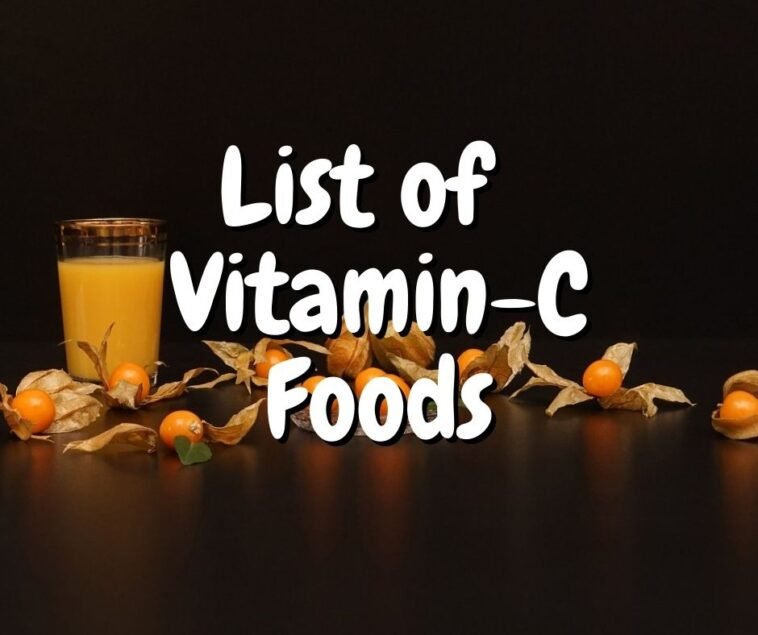As we all know that vitamin C is a water-soluble vitamin available in various fruits and vegetables. Vitamin C has a potent antioxidant that is beneficial for skin and immunity purposes.
Vitamin C is also crucial for collagen synthesis, connective tissues, bones, teeth, and small blood vessels.
You can get to know about vitamin C deficiency by symptoms of bleeding gums, periodic bruising and infections, slow injury healing, anaemia, and scurvy.
Now let us check out the list of High Nourishment Vitamin C fruits and vegetables.
1. Kakadu Plums
The Kakadu plum is an Australian superfood that enriches 100 times more vitamin C than any oranges. It has 5.300 mg vitamin C per 100 grams. It is also full of potassium, vitamin E, and the antioxidant lutein, which is healthy for the eyes.
2. Acerola Cherries
The 49 grams of red acerola cherries have 822 mg of vitamin C. Studies have shown that they have a cancer-fighting spirit, aid averts skin damages, and lessen DNA damage caused by a bad diet.
3. Rose Hips
The rosehip is a tiny, sweet, tangy fruit of the rose plant, full of vitamin C. Almost six rosehips have 119mg of vitamin C.
As we have seen above that vitamin C is required for collagen synthesis, which helps skin integrity as you age.
Studies have also shown that vitamin C lessens the sun damage to the skin, lessening wrinkling, dryness, and patches and ameliorating its all-inclusive appearance.
4. Chili Peppers
One green chili pepper accommodates 109 mg of vitamin C. As compared to one red chili pepper brings 66 mg of vitamin C.
However, chili peppers are full of capsaicin, the compound that is in charge of hot taste. Capsaicin also decreases pain and inflammation.
5. Guavas
Guavas is a tropical fruit, vernacular to Mexico and South America. Single guavas provide 126 mg of vitamin C and are rich in the antioxidant lycopene.
6. Sweet Yellow Peppers
The 75 grams of yellow peppers contain 137 mg of vitamin C, twofold of green peppers. Sufficient consumption of vitamin C is crucial for eyes health and also provides protection against cataract progression.
7. Blackcurrants
The 56 grams of blackcurrants provide 101 mg of vitamin C. The antioxidant flavonoids are also known as anthocyanins provide them rich and dark color, which help to lessens chronic diseases, heart disease, cancer, and neurodegenerative diseases.
8. Thyme
Thyme provides more vitamin C than any culinary herbs with 160 mg per 100 grams. They are full of vitamin C and raise immunity.
9. Parsley
The 8 grams of raw parsley provide 10 mg of vitamin C. Parsley is an important source of plant-based non-heme iron.
Vitamin C increases the incorporation of non-heme iron, beneficial for iron deficiency anaemia.
10. Mustard Spinach
One cup of fresh chopped mustard spinach has 195 mg of vitamin C. However, heat from cooking lessens the vitamin C content, still, one cup of cooked mustard contains 117 mg of Vitamin C.
11. Kale
One cup of chopped fresh kale contains 80 mg of vitamin C. Kale also bestows high quantities of vitamin K and the carotenoids lutein and zeaxanthin.
12. Kiwis
One medium-sized kiwi has 71 mg of vitamin C. Kiwis are helpful in reducing oxidative stress, lessens cholesterol, and improve immunity.
13. Broccoli
Broccoli is also known as a cruciferous vegetable. One-half cup of cooked broccoli contains 51 mg of vitamin C. They are also helpful to lessen the possibility of inflammatory diseases.
14. Brussels Sprouts
One-half cup of cooked brussels sprouts contains 49 mg of vitamin C. Like every other cruciferous vegetable, they are also enriched in fiber, vitamin K, folate, vitamin A, manganese, and potassium.
Vitamin C and K both are crucial for bone health. However, vitamin C supports the emergence of collagen, which is the muscular part of bones.
15. Lemons
One entire fresh lemon, with its peel, contains 83 mg of vitamin C. The vitamin C of lemon juice also reacts as an antioxidant.
16. Lychees
One lychee contains approx 7 mg of vitamin C. They also provide omega-3 and omega-6 fatty acids, which are beneficial for the brain, heart, and blood vessels.
17. American Persimmons
Persimmons are an orange color fruit that is similar to a tomato. They have many different varieties. However, the Japanese persimmon is popular, the domestic American persimmon provides nine times more vitamin C. One American persimmon provides 16.5mg of vitamin C.
18. Papayas
The 145 grams of papayas contain 87 mg of vitamin C. Vitamin C is also helpful for memory and has anti-inflammatory effects on the brain.
19. Strawberries
The 152 grams of strawberry halves contain 89 mg of vitamin C. They have a various and vigorous mix of vitamin C, manganese, flavonoids, folate, and other crucial antioxidants.
20. Oranges
The one medium-size orange contains 70 mg of vitamin C. They are also crucial for dietary vitamin C intake. Vitamin C is crucial for the immune system, connective tissue, and heart & blood vessel health. Not having an adequate amount of vitamin C can have a negative impact on health. By consuming suggested fruits and vegetables you can recover from the deficiency of vitamin C. A diet full of vitamin C is an important step towards good health.



